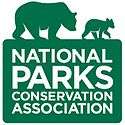National Parks Conservation Association
 | |
| Founded | May 19, 1919 |
|---|---|
| Founder | Stephen Mather et al. |
| Focus | Protecting the US National Park System |
| Location | |
Area served | United States |
Members | Over 1,000,000[1] |
Revenue | $37,444,618 USD[2] |
Employees | Approximately 170[3] |
| Slogan | "Protecting our national parks for future generations" |
| Website | http://www.npca.org/ |
The National Parks Conservation Association (NPCA) is the only independent, membership organization devoted exclusively to advocacy on behalf of the National Parks System. Its mission is "to protect and enhance America's National Park System for present and future generations."
History
Founded in 1919 as the National Parks Association, the organization was designed to be a citizen's watchdog for the National Park Service (NPS) created in 1916. Among the founders of NPA was Stephen Mather, the first director of the National Park Service. Robert Sterling Yard was NPA's first employee. Although Yard received personal financial support from Mather, the two often differed on development issues in the parks. Taking a strong preservationist position, Yard objected to such commercialization of the parks as the jazz bands and bear shows at Yosemite National Park.[4]
The association continued to resist commercial efforts to build dams and promote mining, logging and hunting in the national parks. In 1970, the organization changed its name to the National Parks and Conservation Association, in response to the national attention to a new range of emerging environmental issues, including air and water pollution. This was shortened to National Parks Conservation Association in 2000.
Activities
Led by President and Chief Executive Officer Theresa Pierno, the nonpartisan NPCA works on the ground, in and around national parks, conducting research, and working with National Park Service staff, community leaders, park advocates, and state and federal legislators to ensure that National Parks are "welcoming and well funded, well managed, and well protected for present and future generations".[5]
Today, NPCA has grown to 25 regional and field offices around the country.[6] It publishes a quarterly magazine, National Parks, which is distributed primarily to its members.
Legislation
Supported
The North Fork Watershed Protection Act of 2013 is a bill that would withdraw 430,000 acres of federal lands in Montana from programs to develop geothermal and mineral resources.[7][8] The law would forbid mountaintop removal mining and other natural resource development.[8] The affected lands lie adjacent to Glacier National Park and already have some protections.[7] The bill follows up on an agreement between Canada and the United States on how to protect the trans-border area from the effects of mining.[9] In the 2010 agreement, Canada agreed not to do any additional mining on the British Columbian Flathead with the expectation that Montana would do the same thing to its land.[9] The NPCA supported the bill, saying the bill "protects both our outdoor heritage and our economic future for generations to come."[10]
Opposed
The NPCA opposed the Water Rights Protection Act, a bill that would prevent federal agencies from requiring certain entities to relinquish their water rights to the United States in order to use public lands.[11][12] According to opponents, the bill is too broad.[12][13] They believe the bill "could also block federal fisheries agencies like the United States Fish and Wildlife Service from requiring flows that help salmon find fish ladders and safely pass over dams."[12]
Charity ratings and financials
The NPCA currently has an overall 3 star (out of 4) rating from Charity Guide. It received a score of 76.73 (out of 100) for Financial and 97.00 for Accountability and Transparency for Fiscal Year 2015.[14]
Fiscal year 2014 tax filings (form 990) shows that staff salaries were equal to 44.9% of revenues.[15]
See also
Notes
- ↑ NPCA Who We Are
- ↑
- ↑ Meet the Staff of the NPCA
- ↑ Miles, Guardians of the Parks, pp. 4-52.
- ↑
- ↑ NPCA Where We Work
- 1 2 "CBO - H.R. 2259". Congressional Budget Office. Retrieved March 2, 2014.
- 1 2 Scott, Tristan (March 30, 2013). "Daines to introduce legislation protecting North Fork Flathead". Missoulian. Retrieved March 4, 2014.
- 1 2 Frye, Katrin (January 31, 2014). "A major step towards protection of the North Fork Flathead River". Montana Public Radio. Retrieved March 4, 2014.
- ↑ "North Fork Watershed Protection Act Would Protect Beauty and Viability of the Greater Crown of the Continent Without Infringing on Private Property Rights". National Parks Conservation Association. February 8, 2013. Retrieved March 4, 2014.
- ↑ "H.R. 3189 - CBO". Congressional Budget Office. Retrieved March 11, 2014.
- 1 2 3 Nathan Fey; Matt Rice (December 20, 2013). "'Water Rights Protection Act' puts rivers at risk". Post Independent. Retrieved March 12, 2014.
- ↑ Fey, Nathan (November 12, 2013). "The Water Rights Protection Act is Bad For Rivers - Take Action!". American Whitewater. Retrieved March 12, 2014.
- ↑ http://www.charitynavigator.org/index.cfm?bay=search.summary&orgid=4192
- ↑ http://990s.foundationcenter.org/990_pdf_archive/530/530225165/530225165_201506_990.pdf
References
- John C. Miles, Guardians of the Parks: A History of the National Parks and Conservation Association (Washington, DC: Taylor & Francis, 1995). ISBN 1-56032-446-5